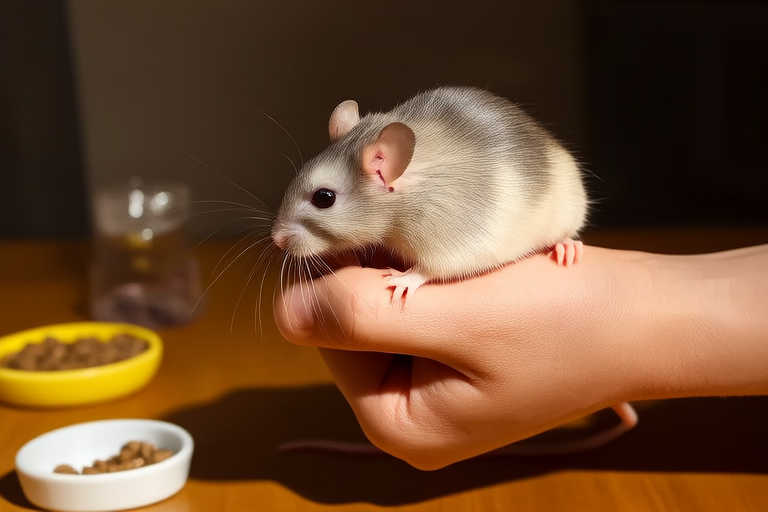From Pocket Pet to Pal: All You Need to Know About Fancy Rats

Fancy rats have been captivating hearts since ancient times, and today they remain one of the most beloved pets. With their intelligence, social nature, and playful demeanor, these rodents make wonderful companions. Let’s delve into the world of fancy rats, covering everything from their history to how to care for them properly.
Rat History
The domestication of fancy rats began in the 18th century when people started breeding them as pets. Initially bred for rodent racing and later for show purposes, they were selected based on desirable traits like color patterns and docile temperaments. Today, there are numerous breeds recognized by organizations such as the American Fancy Rat and Mouse Association (AFRMA).
Historically, rats have had a bad reputation due to their association with disease outbreaks. However, modern-day fancy rats are clean animals that pose no significant health risks to humans if handled responsibly. They can even be trained to perform tricks and respond to commands.
Characteristics
Fancy rats come in various colors, including black, white, cinnamon, chocolate, and more. Their coats range from smooth to long-haired varieties like Rex and Dumbo. These small mammals typically weigh between 250 grams and 450 grams when fully grown.
One of the most striking features of fancy rats is their large, expressive eyes. This trait has earned them nicknames like ‘velvet noses’ because they often nuzzle owners affectionately. Rats are highly social creatures who thrive on interaction with both humans and other rats. In fact, studies show that rats exhibit empathy towards each other, making them excellent companions.
Care Requirements
Proper care involves providing adequate space, toys, bedding material, food, water, and regular cleaning. A cage measuring at least 60cm x 60cm x 40cm high would suffice for two adult rats. Ensure there’s enough room for climbing structures, exercise wheels, tunnels, and hideouts.
Bedding materials like shredded paper or wood shavings work well but avoid cedar chips as they contain aromatic oils harmful to respiratory systems. Clean cages weekly, spot clean daily, and wash accessories periodically.
Common Health Issues
Like any animal, fancy rats may face certain health challenges. Respiratory infections, tumors, and dental problems are among the top concerns. Regular veterinary checkups help catch potential issues early.
Respiratory infections can cause sneezing, wheezing, or nasal discharge. Tumors often develop in older females but can occur in males too. Dental issues result from overgrown teeth requiring professional trimming. Maintaining a clean environment reduces the risk of infections while providing balanced nutrition supports overall health.
Diet
A healthy diet consists primarily of commercial pellets designed specifically for rats. Supplement this with fresh fruits, vegetables, and occasional treats like seeds or nuts. Avoid feeding sugary snacks or foods high in fat.
Vitamin C deficiency is common in rodents without sufficient dietary intake. Fresh fruits rich in vitamin C, such as oranges or bell peppers, help prevent scurvy symptoms like swollen joints or lethargy. Always introduce new foods gradually to monitor reactions.
Housing
Choose a spacious cage with multiple levels for climbing and exploring. Provide chewable items to keep teeth trimmed, such as wooden blocks or untreated cardboard boxes. Ensure good ventilation but prevent drafts. Position the cage away from direct sunlight and loud noises.
For enrichment, add tunnels, hammocks, and puzzle feeders. Rotate toys periodically to maintain interest. Keep bedding clean and change it regularly.
Training Tips
Rats learn quickly through positive reinforcement techniques. Start by rewarding desired behaviors with small treats or praise. Teach basic commands like ‘come’ or ‘sit’ using clicker training methods.
Handle your rat gently yet frequently so they become accustomed to human touch. Begin sessions short and increase duration over time. Patience and consistency yield best results.
Advice for Beginners
Before adopting a rat, consider factors like time commitment, living situation, and financial resources. Research local shelters or breeders offering reputable stock. Prepare necessary supplies beforehand.
Remember, rats live approximately two to three years, so commit to their care throughout their lifetime. Seek guidance from experienced owners or online communities for support.
Conclusion:
Fancy rats offer an enriching experience for those willing to invest time and effort into understanding these fascinating creatures. By learning about their needs and providing appropriate care, you’ll enjoy a rewarding relationship with your new furry friend.
